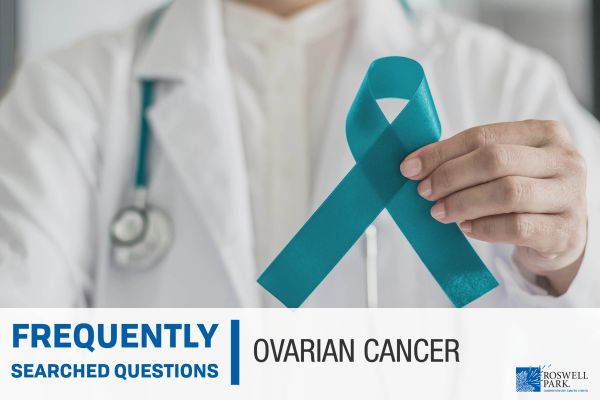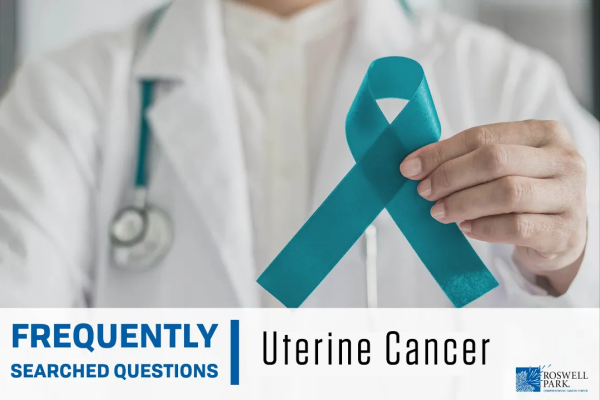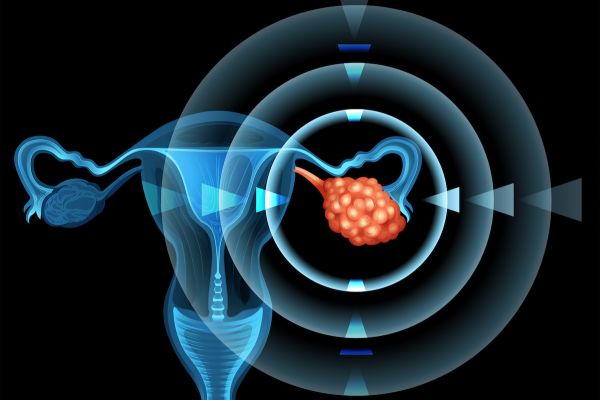A new study in Utah found that women diagnosed with more severe types of endometriosis might also have a higher risk of developing ovarian cancer. Nicole Gaulin, MD, a gynecologic oncologist at Roswell Park Comprehensive Cancer Center says it’s no reason to panic.
“The population-level study looked at women who had endometriosis and those who did not and compared their rates of ovarian cancer overall. It found really strong data to suggest that there is an association between certain types of endometriosis and the development of subsequent ovarian cancer,” Dr. Gaulin says.
“Endometriosis is when the glands or the lining of the uterus implants in places it’s not supposed to be, on the ovaries or inside the abdominal cavity. Common symptoms are severe pain, abnormal uterine bleeding, pelvic pressure and discomfort,” she explains.
The condition is graded based on where it develops and how severe it is: superficial endometriosis is found on the surface lining of the abdomen, whereas deeply infiltrating endometriosis develops more deeply on the abdominal lining but can affect other organs. A third classification, endometrioma, is when endometriosis causes a “cystic mass that can be considered an endometriosis implant on the ovary,” Dr. Gaulin says.
The Utah study found that the risk of developing ovarian cancer is highest among women with the most severe cases of endometriosis, whether deep infiltrating or endometriomas, but “we do have to remember that ovarian cancer is overall rare,” Dr. Gaulin says. Each year, an estimated 20,000 new endometriosis cases are diagnosed in the United States.
“While the risk of cancer is increased with severe cases of infiltrating endometriosis and endometriomas, it’s still a rare pathology,” she says.
A cancer diagnosis is still rare
According to the study, women with deep infiltrating endometriosis and/or endometrioma had a nearly 10 times higher risk of developing ovarian cancer compared to women without endometriosis; women with more severe forms of endometriosis also faced a 19 times higher risk of developing more rare forms of ovarian cancer as well. Women with superficial endometriosis faced a four times higher risk.
Treatment for endometriosis begins with removing the affected tissue, but it can come back. Some women are prescribed hormonal birth control pills to help with their symptoms and pain, and the onset of menopause typically means the end of symptoms, as the hormone cycle associated with menstruation is directly linked with endometriosis pain.
“Ovarian cancer is rare but it’s also difficult to diagnose in early stages because the symptoms are relatively vague, including bloating, abdominal discomfort, constipation and other issues that can be associated with general illness and premenstrual pains,” Dr. Gaulin says. “Screening for ovarian cancer is difficult because we don’t have a good screening tool for it, and that’s why so many women are diagnosed at such advanced stages.”
Go where the experts are
If you have been diagnosed with ovarian cancer, you need a second opinion. We will ensure you get it without delay.
Genetic mutations increase ovarian cancer risk
Women who have a family history of ovarian or breast cancer, or who know their family has a history of genetic mutations like the BRCA-1 or BRCA-2 gene, should discuss their history with their gynecologist or an expert like Dr. Gaulin and the Roswell Park gynecologic oncology team to determine if they should undergo genetic testing to learn their personal risk.
“Our team here can go very deep into your family history and really assess whether you qualify for genetic testing and what is the right genetic testing for you,” Dr. Gaulin says.
While removal of the ovaries and fallopian tubes is typically not recommended as a treatment for endometriosis of any kind, for women with BRCA mutations it becomes a conversation between a patient and her doctor to determine whether the benefits outweigh the risks. Removing the ovaries and fallopian tubes before natural menopause may include an increased risk of heart attack, stroke, dementia, osteoporosis and early death. For women who decide on this option for addressing their risk of ovarian, breast and other cancers related to BRCA mutations, hormone replacement therapies might be recommended to help mitigate those risks.
Dr. Gaulin urges women to remember that a diagnosis of endometriosis does not mean you will develop ovarian cancer. Each patient knows their body best and should speak up if something doesn’t feel right.
“The Utah study doesn’t say one is going to cause the other. It’s important to talk to your gynecologist about your family history, to know your risks and be an advocate for yourself,” she advises.
She adds that those who know they have a BRCA mutation or a family history of ovarian cancer, it’s time to call Roswell Park for a consultation.
“Our Roswell Park radiologists are experts at reading imaging for women who have cancer and they’re really good at parsing out subtleties in imaging that might be missed by other radiologists,” Dr. Gaulin says.
“Our pathologists look at cancer specimens every day. We have GYN pathologists who really only deal with our patients and become experts not just in the commonly diagnosed diseases but the rarer diseases too.”
Who should have genetic testing?
A genetic evaluation and testing is important for two groups of people: those who have cancer and families with cancers.




